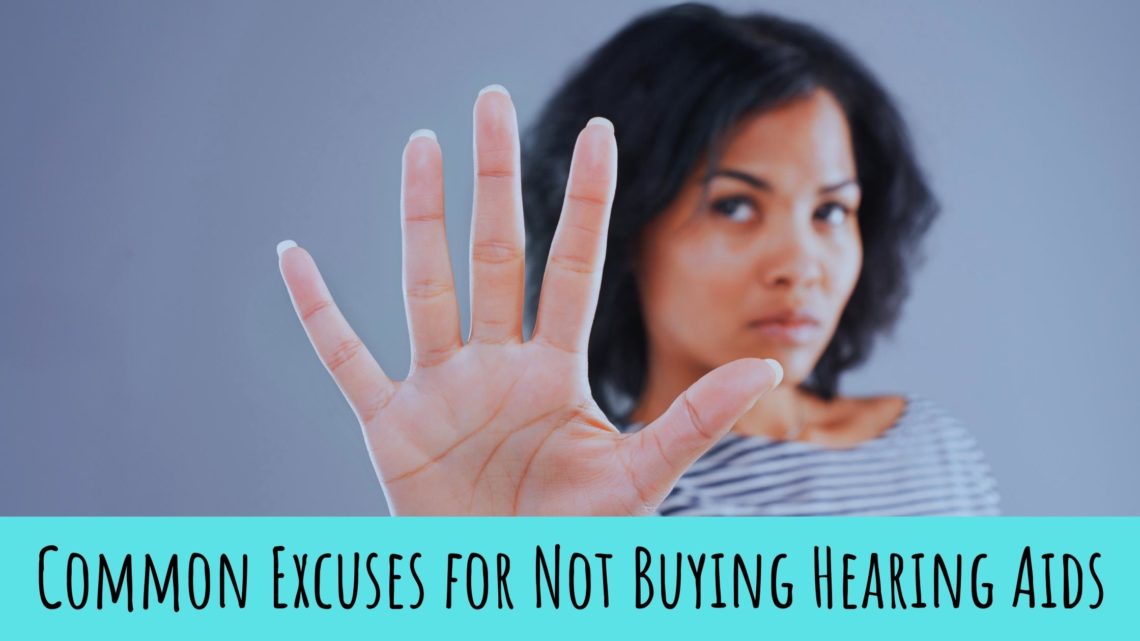It is a fact that most adults over the age of 65 suffer from some degree of hearing loss. Why? As we age, the ear canal and eardrum become stiffer, and the tiny hair cells in the inner ear die off. We don’t hear as well. Treatments exist for this condition. And yet, despite a variety of options, many still are not choosing to address it. Let’s look at some of the common reasons people decide not to see hearing aids.
Excuse #1: “I’m too young for hearing aids”
We’re talking about these issues because many people think that hearing aids are for older people only. However, hearing loss affects many younger people. The term “hidden hearing loss” is used to describe these cases in which a person’s hearing loss goes undetected because they face no obvious day-to-day challenges that indicate difficulties hearing.
Excuse #2: “I’m too old for hearing aids”
Many older adults think they’re too old for hearing aids. As hearing health care providers, we know that the changes hearing loss brings to your life can be significant, no matter the age. There are times you may find yourself saying things like, “it would be nice to hear some birds again” or “I wish I could hear my friends better.” Hearing aids can help anyone at almost any hearing loss level.
Excuse #3: “I’m saving for retirement instead”
Many people focus their saving efforts on retirement and other financial goals. Suppose you are putting money away for your future and maybe even enjoying some small luxuries now, like taking an occasional vacation every year. In that case, you may not want to divert funds from your savings for hearing aids.
However, there must be a balance struck between your future spending potential and the good health you need to enjoy your retirement. Invest a little in your hearing health, and it will pay dividends in your post-work years.
Excuse #4: “My Hearing Loss Isn’t A Problem.”
There are many reasons people refuse to admit they have a problem with hearing. Still, fear of change is not necessarily one of them. Some people feel that admitting they need assistance does not make them feel as attractive or successful as others perceive them.
Excuse #5: “Hearing aids are too expensive.”
It’s no secret that hearing aids can be an investment. But not getting them could be the more costly decision in the long run. Adults with untreated hearing loss made up to 25% less money. They were more likely to be unemployed than those with good hearing, according to a 2013 study.
While many reasons contribute to this number, experts feel it is due to the significance of communication. It’s critical to listen to consumers and collaborate with coworkers to solve problems. Likely, you’re not performing as effectively as you could be if you can’t join in the conversation.
Furthermore, straining to hear for eight or more hours a day can be physically and emotionally draining. You’re more likely to acquire stress and anxiety, which can negatively influence your immune system, sleep, relationships, and general quality of life.
Excuse #6: “Hearing aids don’t work.”
Perhaps they tried some of the low-cost mail-order hearing aids advertised on TV, or perhaps they recall their parents’ or grandparents’ hearing aids. Still, some people’s idea of hearing aids certainly isn’t the same as ours.
The hearing aids of today are technological marvels. They are equipped with tiny computers that provide precise specs for your particular hearing loss. They can also provide tinnitus relief by masking noises, integrating with Bluetooth and other technologies, and reducing background noise. Not only that, but they’re the smallest hearing aids ever: certain types are so small that you’d have to peer inside the ear canal to see them. According to the Better Hearing Institute, a non-profit organization, 91% of persons who received hearing aids in the previous year were satisfied with them.
It was common for those with hearing loss to just accept it as a part of getting older for many years. In some cases, this can lead to depression, withdrawal from loved ones and social activities, and feelings of helplessness or hopelessness in extreme cases.
Professional Hearing Health Care
For this reason, we created an environment where our clients receive one-on-one attention from our expert staff in a comfortable, warm, and welcoming environment. Take the time to schedule a hearing test with our team, so you can regain control of your world.

